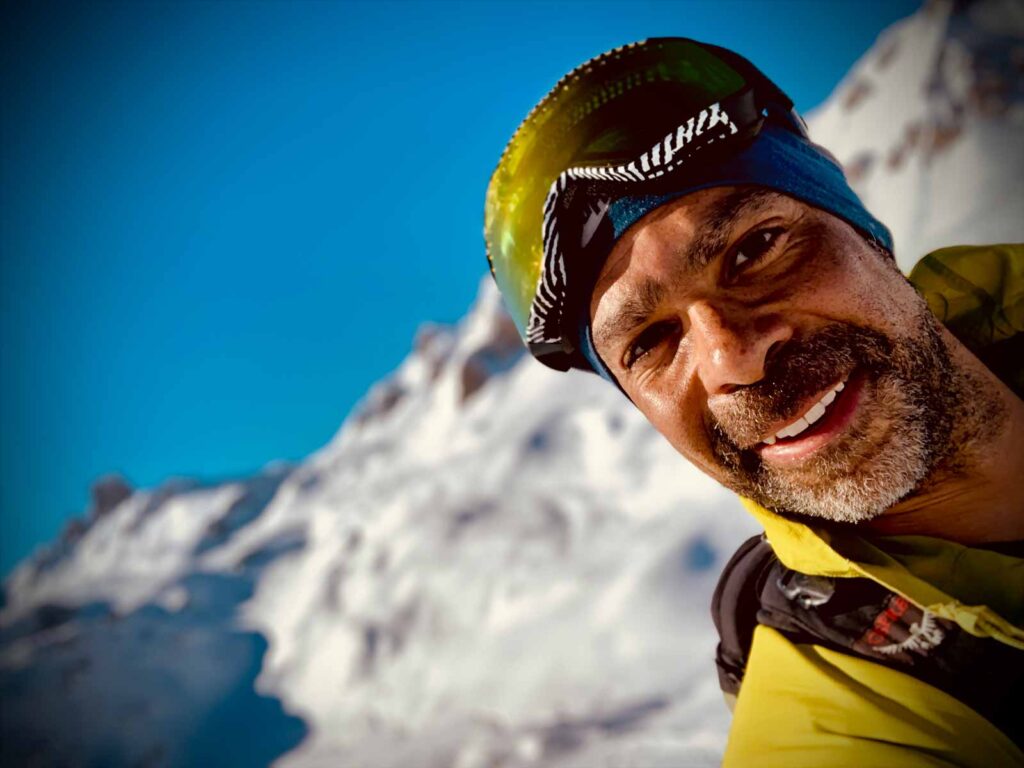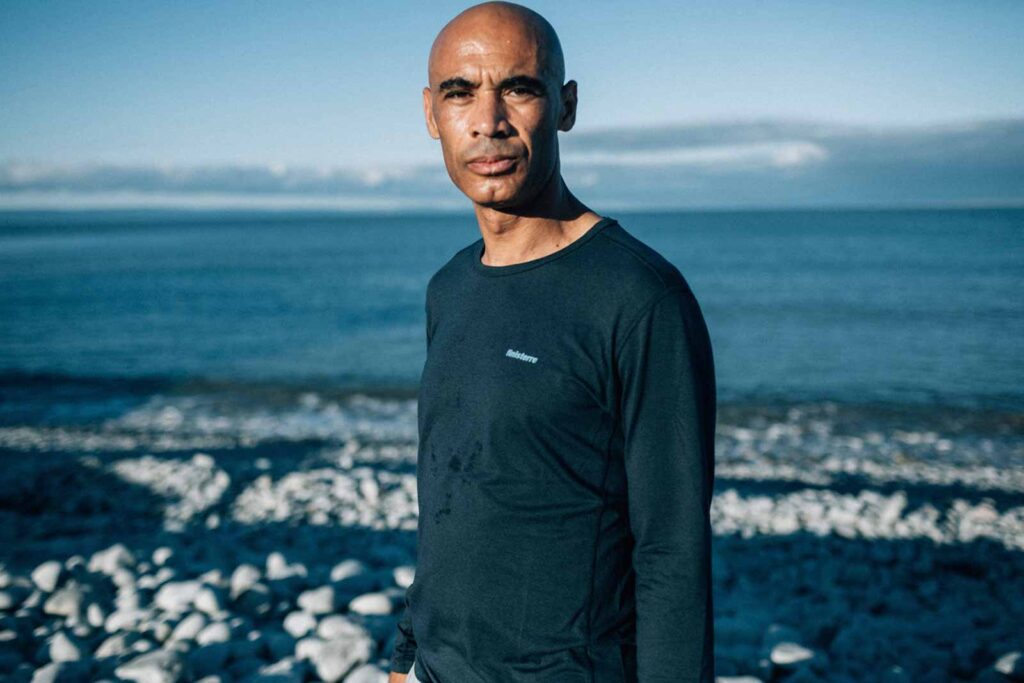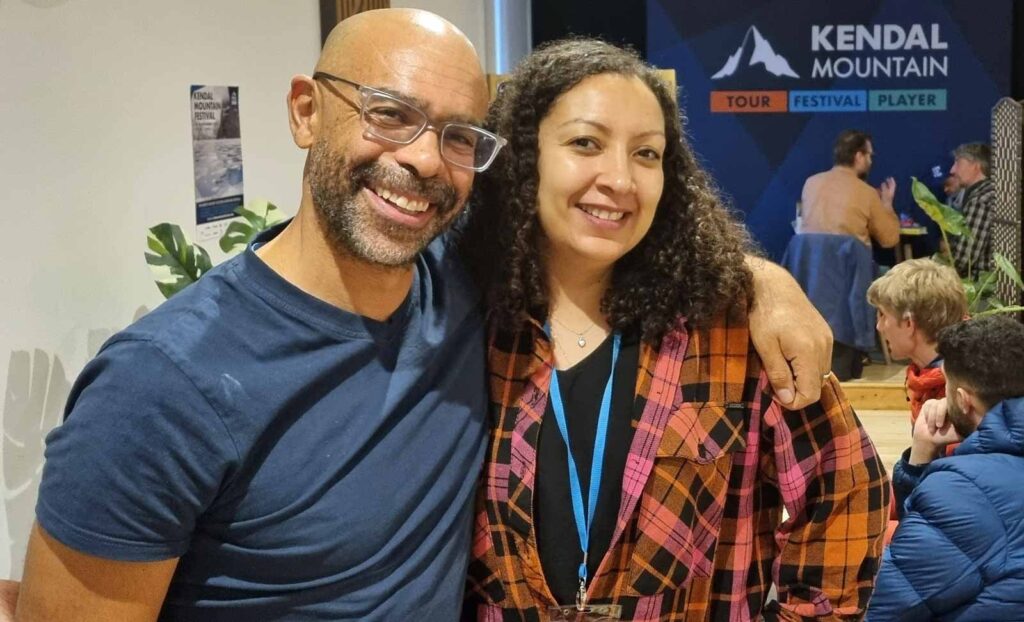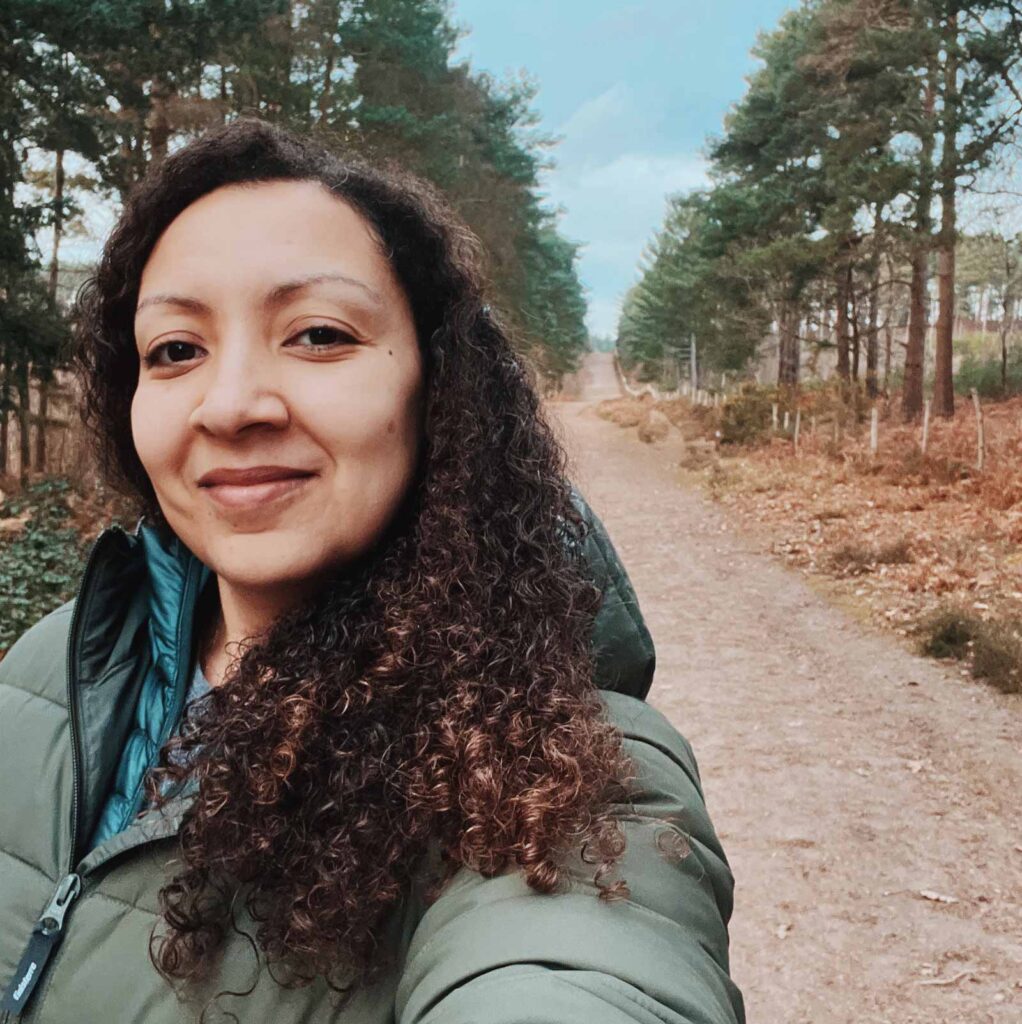To encourage the kind of change needed, OUTO launched its Changemaker Programme. A first cohort of 10 OUTO Changemakers from across the UK received expert-led masterclasses, peer mentoring, business coaching and skilled consulting, joining other entrepreneurs and leaders from diverse sectors. In a programme tailored to individual needs, each member of the cohort learned how to grow sustainably, increase their impact, and support people from ethnically diverse communities.
In September 2022, OUTO was incorporated into the It’s Great Out There Coalition, allowing OUTO to scale up its work beyond the UK, and benefit from an established governance structure and the clear synergies between the two organisations. OUTO co-founder Keme Nzerem was also been appointed vice president of the coalition, further integrating the work of #itsgreatoutthere and Opening Up the Outdoors.
One of the Friends of OUTO is Kendal Mountain Festival, the annual November gathering of the outdoor community in the South Lakeland district of Cumbria, England. At the 2022 festival, we caught up with OUTO co-founders Keme and Phil Young, and OUTO Changemaker, and founder of All The Elements, Soraya Abdel-Hadi.
Can you give us a potted history of Opening Up the Outdoors?
Historically, certainly in this country (the UK), there have not been a lot of people who look like Phil, or me, or Soraya, or other black and brown faces, who are seen doing outdoor pursuits. I’ve personally rarely felt unwelcome in the outdoors, but that’s not the case for everyone. There are a lot of reasons for that – hard and soft barriers – and a little while ago people like me and Phil got together with brands and other colleagues to work out how we could shift the dial on that, and make the outdoors more welcoming for people who might feel uncomfortable or basically not know how to participate, in some case because they spend their lives in cities. We soon discovered that the reality is that there are already lots of amazing people out there running grass roots groups, who are doing the hard work already. It’s tough doing that, leading a Muslim hiking group for example, when you get vile abuse for just wanting to help people go for a hike. So what can we do about that? First, we can accelerate the work of these outdoor groups, who are often doing what they do in their spare time. To run and upscale a group like that requires business skills and no-one is born with those – governance, finance, tax, are the kind of things that get in the way of building a project. So, under the Opening Up the Outdoors (OUTO) umbrella and with the support of brands, we found a specialist training provider called HATCH, and took our first cohort of OUTO Changemakers through the process of developing business skills, helping them to grow their organisations and get to more people. The other part of our work has been to help brands understand how to have great conversations online. So, when they support a black or brown athlete and that individual gets trolled, those brands have the confidence and skills to know how to manage that conversation, which can be quite powerful. And we encourage dialogue between companies, to encourage and help them to back each other up in that online space.
Keme

In practical terms, how does the work of OUTO make the links between brands and grass roots communities?
OUTO is directly working with all of those people on the front line, who are out there pushing for and facilitating activities in the outdoors for their communities, and taking all of the heat for that. And we’re helping the brands that support them to do that in a better and more comprehensive way. It’s easy enough to put a young brown girl on an Instagram account and think ‘yes, job done’, but not consider about what goes on behind that. That person needs to know that the outdoor industry has got their back at every stage and without wavering. It only takes one or two bad experiences with trolls to knock someone and suck out their energy to keep putting themselves in a position where they’re going to be attacked. We – and all of those people and organisations we work with – provide a vital support mechanism that gives these pioneers the confidence, and the social and practical tools, to keep doing what they do. OUTO is a key part of a growing network, which also involves all sorts of businesses operating in this space that give a platform for brands and community groups to work together, including one that I head up called The Outsiders Project.
Phil

It’s hard to be a beginner in the outdoors, whatever your background. It’s even harder if you’re, for instance, veiled or non-conventionally “athletic” body shaped – all of these things add up to thoughts like ‘I’m embarrassed’, or ‘I won’t be welcome’. We have lived experience of this and we’re now helping others to deal with the challenges.
Keme
To make systemic change, it’s clear that individuals or companies cannot succeed in isolation. That’s true of issues like sustainability and it’s true for the work that we do at OUTO.
Phil
There were ten OUTO Changemakers in the first cohort and several are here – in various capacities - at Kendal Mountain Festival. Does the represent progress?
They are all part of this community now. Five years ago, they weren’t, because even if they went into the outdoors, some experienced times when they didn’t feel welcome. Now, they – and Keme and me – very much are. There’s sometimes a perception at well-established events like Kendal, that if you add something, you’re also taking something else away. That’s not the case, and it’s not perceived to be the case here, which is good progress, but there’s a lot more to do throughout the outdoor industry, which is why the work of OUTO is so important.
Phil
What kinds of obstacles prevent more black and brown people engaging with the outdoors?
One of the barriers that we’re trying to break down is any view that there is only one definition of ‘outdoors’. It’s okay if you don’t subscribe to the vision that other people follow. One of our jobs is to champion those who are doing the work to help people find their own way in whatever version of the outdoors works for them, and give them the platform. They know their communities best and how to reach, engage and inspire them. All my life, I’ve been told what’s best for me by people who don’t know me and don’t look like me. That’s another big barrier and we’re here to kick it down.
Phil
In my view at least, there really shouldn’t be a limit to who is in or out – it’s all about growing the community, and it’s not for anyone to define what is or isn’t ‘outdoor’. At the moment, we’re working on identifying what we need to do in terms of training to help the next cohort of OUTO Changemakers take their work into their own communities. We know we need more outdoor specific sessions, and that’s where organisations that already support OUTO or the It’s Great Out There Coalition can offer expert tuition, or access to it. That can range from areas such as event management, to some of the particular skill sets needed on the hill and in the mountains. Our team is at the centre, making those connections, coordinating support where it’s needed most, and supporting our own Changemakers and others as they do their work at a grass roots level.
Keme
What’s next for OUTO?
Well, we’ve created the solid, pan-European entity by combining OUTO with #itsgreatoutthere, and that partnership will really spread its wings in 2023. In the meantime, we got the first cohort of OUTO Changemakers going in a ‘just make it happen’ kind of way, and have put in place all of the essentials for running an organisation like this, such as finance, governance, reporting and assessment of impact, and much more. Up to now, that’s been done by Phil and me with brilliant ad hoc support of teams within the companies that are supporting OUTO. All of that is fine and has been great, but long term, it has to be managed by one central director or secretariat, and that’s what being part of the It's Great Out There Coalition will deliver. That prospect is really exciting, but we’re also proud of what we have achieved so far and the first cohort of OUTO Changemakers has been at the heart of that, none more so than Soraya, who was already elevating the entire community before OUTO was on the scene. We’ve been so fortunate to be able to work with her through this project.
Keme
I run All The Elements, which is a non-profit organisation for everyone who is creating change in diversity in the UK outdoors. We have one-to-one calls with anyone working in that space – they could be researchers, outdoor leaders, working in a National Park, or they could be running community groups. We connect people and organisations with each other, and to sources of funding that will help them grow and get people engaged in outdoor activities. We also host in-person and online events. The latter can be so important, as often for the people we are supporting, there isn’t anyone local who has the same experiences as them, and we can bring them together online from around the country, to have those conversations and share ideas and advice.
Soraya

Tell us more about All The Elements
We started in August 2020 and for the first year, almost everything was online, but now we are able to run physical get togethers, like the capacity building event we recently held with the Youth Hostels Association and Natural England for 100 changemakers. We cover vital topics for individuals and emerging groups, such as whether to incorporate, how to avoid getting sued, how to manage social media, how to secure funding, and many other topics. We help them with project management – some people want to know how to manage to sustain and grow a group while holding down a full-time job. There’s a lot that we do and now that we’re well-established and fairly well known, we also answer a huge variety of questions, which we get from big organisations as well as the community groups. We also offer consultancy. We completed a project with all 15 National Parks to help them develop how they engage with community groups from diverse backgrounds, and I continue to work with some individual parks on specific initiatives. I have also done some work with organisations like the Pilgrim Trust to help them determine how they could better use their funds to support grass roots groups, looking specifically at walking and hiking. And I have an ongoing project with the Youth Hostels Association around how they design and communicate some of their projects in a way that works for diverse groups. There’s lots going on.
Soraya

How has being an OUTO Changemaker helped or elevated your work?
Originally, when I set up All The Elements, it was essentially a newsletter managed around my day job. Although I have got some business training experience, I didn’t really put any of that stuff in place, because it was just a newsletter at the time. Then it suddenly became an online directory, and then a set of resources, and then we were running events! The most helpful part about the OUTO Changemakers programme for me was having the time every other week to take a step back and shape a purpose, and then talk to the rest of the cohort about how they were doing that. Sharing those experiences was invaluable, as was making a record of them. I knew what our purpose was at All The Elements, but I’d never actually written it down. Doing that was really helpful in solidifying what we needed to do next and the process for achieving it. There was also loads of useful material, and sessions on subjects like marketing and branding, and legal issues such as trade marking.
Soraya
We had one OUTO Changemaker who, before she’d been on the programme, had been led to believe that resolving a trade mark issue would cost them thousands of pounds. The tutelage that OUTO was able to provide a really easy and quick, low cost win that was very straightforward.
Keme
At the end of the programme, we had to formulate and present a pitch, which is something that I’d done before, but not for a long time, and it was really useful to go back over that process and hone my skills. It was a good job too, as two weeks later I had to do that at the Blue Earth Summit.
Soraya
How are you going to work with the next cohort of OUTO Changemakers?
I hope that they’re going to come into the All The Elements community. That would be ideal, as that’s where we can provide them with that bigger network and level of support in a broader context. All The Elements has never been about duplicating effort or creating things that already exist, but what we can do is welcome people and organisations into our community, and we can provide that ongoing, independent support network.
Soraya
Before All The Elements, that network didn’t exist. So you built it.
Keme
Yes, we built it and we’ll keep growing it, and we look forward to welcoming more OUTO Changemakers. It’s a virtuous, expanding circle and it’s wonderful to be part of it.
Soraya
To find out more about the work of Opening Up the Outdoors, visit www.openinguptheoutdoors.com.